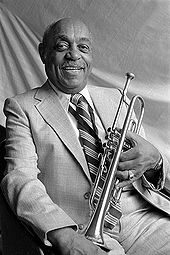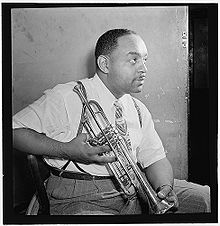Benny Carter
Bennett Lester "Benny" Carter (born August 8, 1907 in New York , USA ; † July 12, 2003 in Los Angeles ) was an American jazz musician ( saxophonist , trumpeter , band leader , arranger and composer ).
biography
Carter learned to play the piano from his mother and was otherwise self-taught on all other instruments. His father was a self-taught guitarist. Influenced by his cousin Cuban Bennett , he began his career as a trumpeter in June Clark's band , then went to Billy Paige, Lois Deppe and Earl Hines . In 1925 and 1926 he worked with Horace Henderson ; In 1928 he moved to his brother Fletcher Henderson . After an interlude at McKinney's Cotton Pickers and his first attempt as a band leader (1928), he was engaged again in 1930 with F. Henderson and then with Chick Webb (1931). In 1932 he founded his own orchestra again, including Wilbur de Paris , Chu Berry , Teddy Wilson and Sid Catlett , and which he was able to hold until 1934. He also wrote arrangements, for example for Duke Ellington .
In 1935 Benny joined Willie Bryant's orchestra as a trumpeter when they went on tour in Europe . In England he arranged for the BBC dance orchestra, in Paris he worked with Willie Lewis. There he recorded for the Swing label in 1937 with Coleman Hawkins and Django Reinhardt's Quintette du Hot Club de France . He was also the first American jazz musician to play in Spain . After further stays in the Netherlands and Scandinavia, he founded a band in New York in early 1939, which began in Harlem's Savoy Ballroom and which u. a. Vic Dickenson , Eddie Heywood , Jonah Jones, and Tyree Glenn included . In May 1940 he achieved his first chart success with “Sleep”; In 1944 he had two more hits in the R&B charts with “ Poinciana (Song of the Tree) ” and his composition “Hurry, Hurry” .
The later bebopers Dizzy Gillespie (1941), and in 1943 Max Roach , J. J. Johnson and Buddy Rich also played in his combo. A greater popularity with the audience, comparable to the bands Goodmans / Dorseys or James , however, did not materialize.
Since the mid-1940s he worked in Hollywood in films, including Stormy Weather (1943, he plays the trumpet there), The Snows of Kilimanjaro (1952) and wrote film scores (including the Gene Krupa story and 1958 the TV series M Squad ). For this reason he also moved to Los Angeles, where he composed during the day and performed in clubs at night. In 1944 he led a band in the Swing Club in Hollywood and made recordings for Capitol ; The singer was Savannah Churchill . In 1951 he accompanied the singer Little Miss Cornshucks on her recordings for Coral , and in 1955 Billie Holiday on her Verve album Music for Torching . In 1960 he turned temporarily back to the concert stage and visited Australia and Europe with Jazz at the Philharmonic . But he also stayed in the television business and wrote and arranged in the studios, including for Count Basie . In 1961 he took part with Coleman Hawkins for Impulse! Records his most famous album, Further Definitions , a kind of reissue of the legendary Paris session in 1937 with Hawk, Stéphane Grappelli , Alix Combelle and Django Reinhardt. In 1968 he played with Gillespie at the Newport Jazz Festival . From the 1970s he appeared again as a soloist, also dedicated himself to jazz pedagogy and gave workshops regularly. At the age of 90, Carter gave concerts (for example with Doug Lawrence ) including respectable saxophone solos and died a month before his 96th birthday.
His influence
Benny Carter can be heard on sound carriers as a pianist, trumpeter, trombonist, clarinetist and on almost all instruments in the saxophone family - but he became famous on the alto saxophone . With Johnny Hodges he made a particular contribution to the development of jazz style on this instrument. He played fluently, in an elegant, often to the Double Time merges swing style . He improvised with a special elegance, melodic variety, full and beautiful tone.
Carter also starred with Oscar Peterson , Ray Brown , Peggy Lee, and Ella Fitzgerald . Some of his compositions are When Lights Are Low (with Spencer Williams ), Only Trust Your Heart , Key Largo , Blue Star , I'm Sorry , I Still Love Him So and The Marriage Blues . He wrote the Kansas City Suite for Count Basie in 1961 .
Awards
He was awarded the National Medal of Arts of the United States ( National Medal of Arts 2000) as well as the French Order for Art and Literature (Officier de l'Ordre des Arts et des Lettres 2001). In 1986 he received the NEA Jazz Masters Fellowship . In 1982, the New York radio station WKCR celebrated Carter's 75th birthday with a show in which his music was played for 177 hours. In 1987 Carter received a Grammy for Lifetime Achievement. His full-length composition "Central City Sketches", recorded in 1987, was nominated for a Grammy in 1988. In total, he was nominated seven times for a Grammy and received it twice (for Harlem Renaissance and Elegy in Blue 1994). In 1989 he was named arranger by the Down Beat in the International Critics Poll. In 1990 the still active Carter was named Artist of the Year by both Down Beat and Jazz Times International . In 1994 he received a star on the Hollywood Walk of Fame and the Kennedy Center Honor in 1996. Also in 1996 he was accepted into the American Academy of Arts and Letters . In 1973 he gave lectures at Princeton and in 1974 their honorary doctorate. He also received honorary doctorates from Rutgers University (1991), Harvard University (1994), where he also lectured, and the New England Conservatory (1998).
Discographic notes
- The Chronological Benny Carter ( Classics , 1929-1941)
- All of Me (RCA, 1934-59)
- Cosmopolite - The Oscar Peterson Sessions (Verve, 1952-54)
- Jazz Giant ( Contemporary Records , 1957) (with Ben Webster , Frank Rosolino, Jimmy Rowles , Barney Kessel , Leroy Vinnegar, Shelly Manne)
- Swingin 'the' 20s ( Contemporary Records - 1958) (with Earl Hines , Leroy Vinnegar, Shelly Manne)
- Helen Humes ( Contemporary Records , 1959) (Benny Carter as band leader & trumpeter with Helen Humes , Frank Rosolino , Teddy Edwards , André Previn , Leroy Vinnegar , Shelly Manne , Mel Lewis )
- Further Definitions (Impulse 1961) (with Coleman Hawkins , Phil Woods , Charlie Rouse )
- The King , 1976, Pablo (with Milt Jackson , Tommy Flanagan , Joe Pass )
- Benny Carter Four, Montreux '77 , Fantasy 1977 (with Ray Bryant (p) Live from Montreux)
- Live in Japan , 1977, Pablo
- A Gentleman and his Music ( Concord , 1985)
- All That Jazz - Live at Princeton (Limelight, 1990) with Clark Terry , Kenny Barron , Rufus Reid
literature
- Morroe Berger, Edward Berger , James Patrick: Benny Carter - A Life in American Music , 1982, 2nd edition, Scarecrow Press 2002, ISBN 978-0810841116
Web links
- Benny Carter's website with discography
- Benny Carter in the Internet Movie Database (English)
- Benny Carter at IJS, Rutgers University
- Obituary in The New York Times
- All about Jazz: Benny Carter
Individual evidence
- ^ "My father was not a musician, he played the guitar by ear" Quoted from The Record Changer, May 1948
- ^ Members: Bennett L. Carter. American Academy of Arts and Letters, accessed February 20, 2019 .
| personal data | |
|---|---|
| SURNAME | Carter, Benny |
| ALTERNATIVE NAMES | Carter, Bennett Lester (real name) |
| BRIEF DESCRIPTION | American jazz saxophonist |
| DATE OF BIRTH | August 8, 1907 |
| PLACE OF BIRTH | New York City |
| DATE OF DEATH | July 12, 2003 |
| Place of death | los Angeles |

